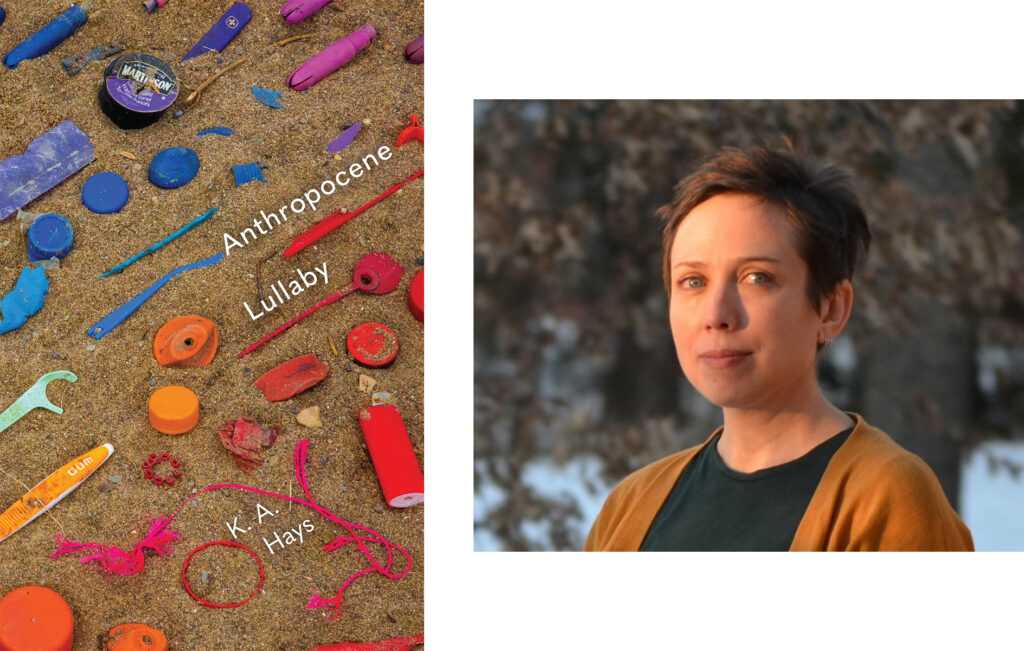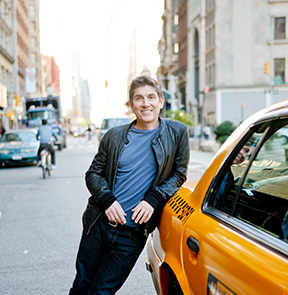K. A. Hays is the author of four poetry collections: Anthropocene Lullaby (2022), Windthrow (2017), Early Creatures, Native Gods (2012), and Dear Apocalypse (2009). Most recently, Hays co-translated, with Keith Waldrop, Before Wisdom: The Early Poems of Paul Verlaine (2023). Hays’ poems have appeared in Best American Poetry (2009, 2011), Best New Poets, and journals such as Southern Review, American Poetry Review, Tin House, and more. Hays teaches in the Creative Writing Program at Bucknell University and is Director of the Bucknell Seminar for Undergraduate Poets.
Former colleagues at The Stadler Center for Poetry & Literary Arts, Joshua Garcia and K. A. Hays conducted this interview via email during July and August 2023.
Joshua Garcia (JG): Your most recent collection, Anthropocene Lullaby, explores, among other things, finding presence in states of deterioration as well as in transformation and renewal. As I was getting ready this morning, I actually put a stone you gifted me in my pocket, carnelian, to ground me going into a kind of uncertain day. You mention little tokens like stones, sea glass, and dragonfly nymph skins throughout Anthropocene Lullaby. You write: “It’s why I keep the rocks on my nightstand. And in my pockets. To remember. I’m just in this shape for a little time.” Why do you think we collect these stones, shells, etc? What do they do for us?
K. A. Hays (KH): Thank you for beginning our conversation this way. Beginning with the image of a special stone slipped into a pocket feels comforting. I’ve kept my eyes to the ground and chosen stones that feel special to me since I was very young––it was a comfort to me then and now. It’s mysterious to me why I do it, why anyone does, but the feeling of it is like this: I am focused on looking for an object that is differently colored or smooth or interestingly shaped. I am absorbed in this looking. I choose something to hold onto, and I’ll form a relationship with that object, giving it special meaning while I hold onto it. I am curious about where it’s been, how long it’s been.
I think this focus, absorption, sorting through, and conferring of meaning on what has been selected is essential to my sense of connection and belonging (as a living thing on the earth, I mean). The process of focusing, sorting through, and conferring meaning on what has been selected is not too different from how I might take a fragment of experience or a few words or an image and try to make some kind of art out of it. It is a comforting process, and it directs my often-anxious mind.
Transformation (of the world or of the self) is inevitable and feels to me at turns ominous and terrifying and exciting and joyful—and it is OK that it brings all of these feelings.
JG: There is often a tension between “hereness” and transformation in Anthropocene Lullaby. Sometimes transformation feels ominous, as when you write about climate change and the pollution of our environment and bodies. Other times, as when dragonflies shed their nymph skins, the possibility of growth and renewal is exciting. How do you balance hereness with all the challenges and/or excitement that come with change? What are you doing to ground yourself these days, to be present with yourself and your writing?
KH: I have to remind myself that transformation (of the world or of the self) is inevitable and feels to me at turns ominous and terrifying and exciting and joyful––and it is OK that it brings all of these feelings. I have to remind myself that I don’t need to process transformation or changes in a particular way. To ground myself, to be present with myself and my writing, I need little snatches of time alone. These times can be very active for me––I can be cleaning a toilet, ha, but having quality mental time, focusing on tangible detail, remembering that my distinct perspective and sensory perceptions at this moment are the only ones exactly like this, right now, anywhere. How fascinating is that? I think of other perceptions, too: a specific individual sea turtle, right now, as I type this (or as you read this) has a first-person perspective and perceptions that are unlike anyone else’s anywhere at this exact moment. That kind of thinking helps ground me: to think of other individuals who are perceiving at this instant. Then to return to my own perceptions. What details of my surroundings at this moment might I have easily overlooked? What’s off-center, strange? How does the air smell now, and now? What are the sounds? Even though time seems to move fast through decades now (I am almost 43 years old!), I can slow down and feel the weirdness of having a first-person perspective and body here in this hereness!

JG: Speaking of hereness, several of your poems seem to be place-based with real and normal locations in their titles (ex. “Lines written in the Walmart Supercenter parking lot, Lewisburg, Pennsylvania”). What catches your attention in a place like a Walmart parking lot or a dairy farm or an aquarium? What makes you feel here?
KH: I think what catches my attention are details that I could easily have missed if I were too focused on my reason for being in the place. In other words, my reason for being at Walmart may be to bring my child to shop for Pokémon cards, and therefore I might focus only on the Pokémon aisle, then on the checkout––doing that, I could miss the roof of the Walmart or who else is parked in the lot right now in the early morning or how the air feels, and these random perceptions are what makes my unique perspective interesting, so much my own. I feel here when I notice the wing of a moth crushed on the edge of a table, or how the tips of the spruce have suddenly gone bright yellow-green with new soft growth, or how my straw hat is crushed on one side, and I don’t know how it got that way, or there’s a large, dusty boot print high up on the boards of the ceiling in my cabin, and how did it get there? Here is a very strange, temporary state, and so full. Every here is a beginning, too. A beginning again.
JG: The poems in this collection are somewhat of a departure from your other collections, particularly your prose poems. How do you see yourself transforming as a writer? What do you think is aiding that transformation?
KH: For a time, when I was a decade or more younger, I wanted my poems to be very spare, cut back to what was really essential, and I still honor that impulse––I love that impulse. But as I become middle aged, I am more interested in allowing my own weirdness and what seems “less essential” into my poems, letting the poems be bulkier and fold in more complexity, surprise me more, and bring in more of the little oddities of my daily life with all of its interactions with screens. It is likely my changing brain chemistry that invites me to do this. And isn’t it weird that my brain or consciousness is telling me to mention its own changing chemistry, and yet it doesn’t really, deeply understand what “it” even is? And now “I” am talking about my mind as “it,” as if we’re separate? That kind of weirdness interests me, and I want to get it into the writing more.
Anthropocene Sonnet
By K. A. HaysOn the drive home, a busted traffic light dangles,
swinging by a wire above the snaking cars.
Furry appendages litter the road’s edge, dramatizing
the entire skittery history of mammalian striving.
Born at the end of the age of sea glass, I walk
the shorelines with my eyes to my toes, bend & lift,
bend & look. I save the green, brown, & clear frosted shards
to feel with my fingers for comfort. I set the sea glass
on my dresser with stones and shells. Meanwhile,
I play midwife to the age of sea plastics.In the last nanosecond of the grand project of being,
Reprinted with permission from the author.
I come along, make a pit stop at Baskin Robbins
to eat some sweetness, & toss away my plastic spoon—
JG: In the poem “Anthropocene Lullaby,” you write “I’m becoming all too flush / with screens, a host / of pixie-pixels / [. . .] I’m flush with them, my mind hums / with what was once their heat.” In other poems, the speaker is disrupted by notifications or anxiety is personified as checking their phone. I know I’m perpetually frustrated with my screen time and sense that it’s interfering with my writing, with my ability to be awake and observe what’s around me. Do you talk with your creative writing students about our alertness and awakeness as writers and our screens, distractions, lullabies?
KH: I talk often with creative writing students about how screens can turn my attention, can call me to them almost, and many students have shared that they, too, struggle with this sense of always needing to return to their phones. One of my students last semester had a sticker on her phone that made me smile, some simple phrase like “look outside your phone.” Such a wise reminder. Just like you, I feel perpetually frustrated with screen time, yet I feel tugged to check. Why are the notifications in my phone often more important to me than using my wonderful bodily senses to perceive the physical world outside of screens? I don’t like the hold screens have over me. I work to leave my phone somewhere and to be a physical embodied being without a screen––and I know even little bits of time without it are better than none. But because screens do have a hold over my thinking and perceiving, I have been working to fold my mind’s entanglement with screens into the newer poems––it seems important to help me process what is happening by bringing this major presence into the poems.
In the classroom, I feel my role is to model for students a way of being curious, receptive, willing to ask real questions and to struggle with the answers, to admit that I am unsure . . .
JG: In “Lines written on Jasper Beach, Machiasport, Maine,” the speaker of the poem watches her son building a city with sticks and stones during “the hottest June on record.” The boy’s city collapses, and he looks at it and says, “I know I can build it better / [. . .] careful, / careful, as if he alone has been charged / with saving it all.” This moment balances a kind of optimism with the difficult knowledge that we are passing on a great challenge to younger generations. How do you see this scene repeating itself with your students, as poets or as humans?
KH: I feel grief and guilt and dread about how I’ve personally contributed to climate change. And also grief and guilt and dread about feeling these feelings yet not finding some new way to create action that feels as if it has important effects on climate change. I feel grief/guilt/dread about what my children or my students may witness and experience in the future––and be complicit in causing––even as I hope that they’ll have the gift of living on long after me and experiencing old age and feeling wonder over the weird complexity of being with consciousness. I don’t want my students or children or anyone younger than me to feel they’ve been handed this horrible burden of figuring out how to live with and mitigate human-caused climate change, and yet they have been. It’s been done; it will be done. What I hope is that they also find beauty in the details of being alive, that they can be here, really here, in the now that isn’t yet here, and feel the new beginning in that.
JG: There’s a phrase in “Anthropocene Sonnet” that I keep returning to: “the grand project of being.” This line really struck me. It suggests effort and perhaps even design, but the poem ends with the speaker casually discarding a plastic spoon—both a conduit of human pleasure and environmental harm. What is our responsibility as artists and writers occupying brief time in this “project”? And how do we balance that responsibility with human pleasure?
KH: I guess I can only speak to what I feel is my personal responsibility occupying brief time here in this “grand project of being,” that is so much more than any of our minds can know. I think each artist or writer discovers or figures out their own responsibility for themselves. Mine is to keep asking my questions, struggling, being aware, knowing always that I have more work to do, more growing and changing to do, that I’m flawed, complicated, and also curious, open, willing to keep thinking and changing. And as for balancing what I see as my responsibility with what I experience as pleasure––feeling pleasure along the way is healthy. It’s okay to feel pleasure. It is okay to be flawed. It’s okay to be.
JG: Poets are all familiar with the search for an epiphany—that image or idea that illuminates something for us as readers and writers. As a poet this can be a lot of pressure, to always lead your reader toward an awakening, but I was relieved and encouraged to see your phrase “low-key epiphanies” in your poem “Everything’s relevant, nothing obsolete.” This poem also ends with a kind of peace with the not-knowing how everything will turn out or what everything means. In this sense, it almost feels like your epiphany is an anti-epiphany. What do you think about this idea of not having the answers? And how can we teach from a place of not-knowing?
KH: Sometimes a wise answer is not to seek a definitive answer. Sometimes a wise answer is a question. I don’t know much––that’s honest. I feel the truth of Aristotle’s famous idea––the more I know, the more I know I don’t know. In the classroom, I feel my role is to model for students a way of being curious, receptive, willing to ask real questions and to struggle with the answers, to admit that I am unsure, to listen carefully and try to learn from the different perspectives of those around me, to be with what’s not yet formed or difficult or complicated or uneasy and not judge it, but hold it, together, passing it between us. That’s what I hope my classrooms model.
Joshua Garcia's debut poetry collection, Pentimento, is forthcoming with Black Lawrence Press (Spring 2024). His poetry has appeared or is forthcoming in The Georgia Review, Ninth Letter, North American Review, Ploughshares, and elsewhere. He holds an MFA from the College of Charleston and was a 2021-22 Stadler Fellow at Bucknell University. He lives and writes in Brooklyn, New York.




